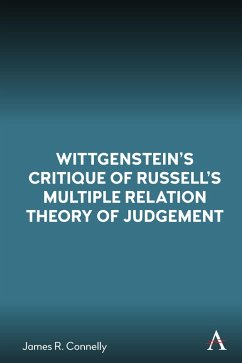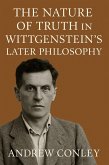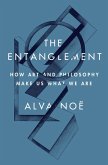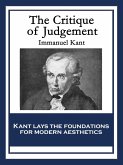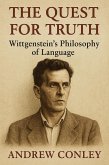Wittgenstein's May-June 1913 critique of Russell's multiple-relation theory of judgement (or MRTJ) marked a crucial turning point in the lives of two great twentieth-century thinkers. But it was also a watershed moment within the history of analytic philosophy itself. The critique led Russell to abandon his 1913 Theory of Knowledge manuscript and left a significant breach within his epistemology. It represented an important milestone within Wittgenstein's philosophical development and marked the point at which he emerged on the scene as an independent philosophical force. It inaugurated the linguistic turn in twentieth-century philosophy which would dominate the course of analytic philosophy throughout the early and middle part of that century. For these and other reasons, it is worthy of careful study and deep understanding.
Yet scholarly consensus around a satisfactory interpretation of the nature of the critique, the extent of and reasons for its impact on Russell, along with the role it played within Wittgenstein's developmental trajectory have remained elusive. This partly reflects the fact that a correct interpretation of Wittgenstein's critique depends upon a satisfactory resolution of several other, related exegetical controversies within the interpretation of Russell's and Wittgenstein's respective philosophies.
With these facts in mind, this book aims to accomplish four interrelated goals. The first is to develop a compelling reading of Wittgenstein's May-June 1913 critique of Russell's MRTJ. For reasons which will become clear over the course of the book, this reading is called the 'logical interpretation' (or LI). The second main objective of the book is to defend LI against its most prominent competitors in the scholarly literature. These include interpretations of Wittgenstein's objection offered by Nicholas Griffin and Steven Sommerville, Gregory Landini, Graham Stevens, Peter Hanks, Christopher Pincock, Rosalind Carey, Fraser MacBride and Samuel Lebens. Third, the book aims to situate Wittgenstein's critique of the MRTJ and Russell's reaction to it, within the broader context of each of Wittgenstein's and Russell's respective philosophical developments. While much scholarship has focused on probing the role played by the objection within the evolution of Russell's thought, much less has been done to explore the impact on Wittgenstein's development. Still less, if any scholarship has been devoted to highlighting the significant traces of Wittgenstein's critique which can be found latent within his later philosophical viewpoint. This book seeks to fill these lacunae in the scholarship on Wittgenstein while also adding to the high-quality work on Russell which has already been done in this area. Fourth and finally, the book aims to introduce students and scholars of early analytic philosophy to and familiarize them with the historical events, textual evidence, scholarly controversies, letters, notes and diagrams, consideration of which is integral to constructing a plausible reading of Wittgenstein's objection. To that end, it brings together a broad selection of relevant materials and information in a clear, accessible and organized way into one, relatively concise source.
Yet scholarly consensus around a satisfactory interpretation of the nature of the critique, the extent of and reasons for its impact on Russell, along with the role it played within Wittgenstein's developmental trajectory have remained elusive. This partly reflects the fact that a correct interpretation of Wittgenstein's critique depends upon a satisfactory resolution of several other, related exegetical controversies within the interpretation of Russell's and Wittgenstein's respective philosophies.
With these facts in mind, this book aims to accomplish four interrelated goals. The first is to develop a compelling reading of Wittgenstein's May-June 1913 critique of Russell's MRTJ. For reasons which will become clear over the course of the book, this reading is called the 'logical interpretation' (or LI). The second main objective of the book is to defend LI against its most prominent competitors in the scholarly literature. These include interpretations of Wittgenstein's objection offered by Nicholas Griffin and Steven Sommerville, Gregory Landini, Graham Stevens, Peter Hanks, Christopher Pincock, Rosalind Carey, Fraser MacBride and Samuel Lebens. Third, the book aims to situate Wittgenstein's critique of the MRTJ and Russell's reaction to it, within the broader context of each of Wittgenstein's and Russell's respective philosophical developments. While much scholarship has focused on probing the role played by the objection within the evolution of Russell's thought, much less has been done to explore the impact on Wittgenstein's development. Still less, if any scholarship has been devoted to highlighting the significant traces of Wittgenstein's critique which can be found latent within his later philosophical viewpoint. This book seeks to fill these lacunae in the scholarship on Wittgenstein while also adding to the high-quality work on Russell which has already been done in this area. Fourth and finally, the book aims to introduce students and scholars of early analytic philosophy to and familiarize them with the historical events, textual evidence, scholarly controversies, letters, notes and diagrams, consideration of which is integral to constructing a plausible reading of Wittgenstein's objection. To that end, it brings together a broad selection of relevant materials and information in a clear, accessible and organized way into one, relatively concise source.
Dieser Download kann aus rechtlichen Gründen nur mit Rechnungsadresse in A, D ausgeliefert werden.

